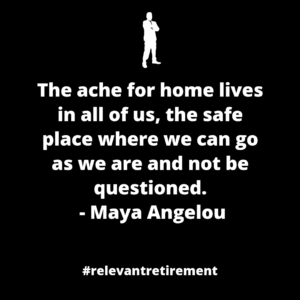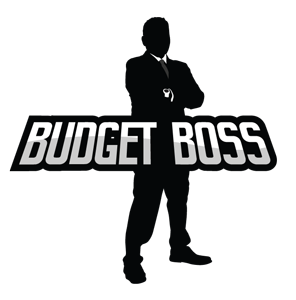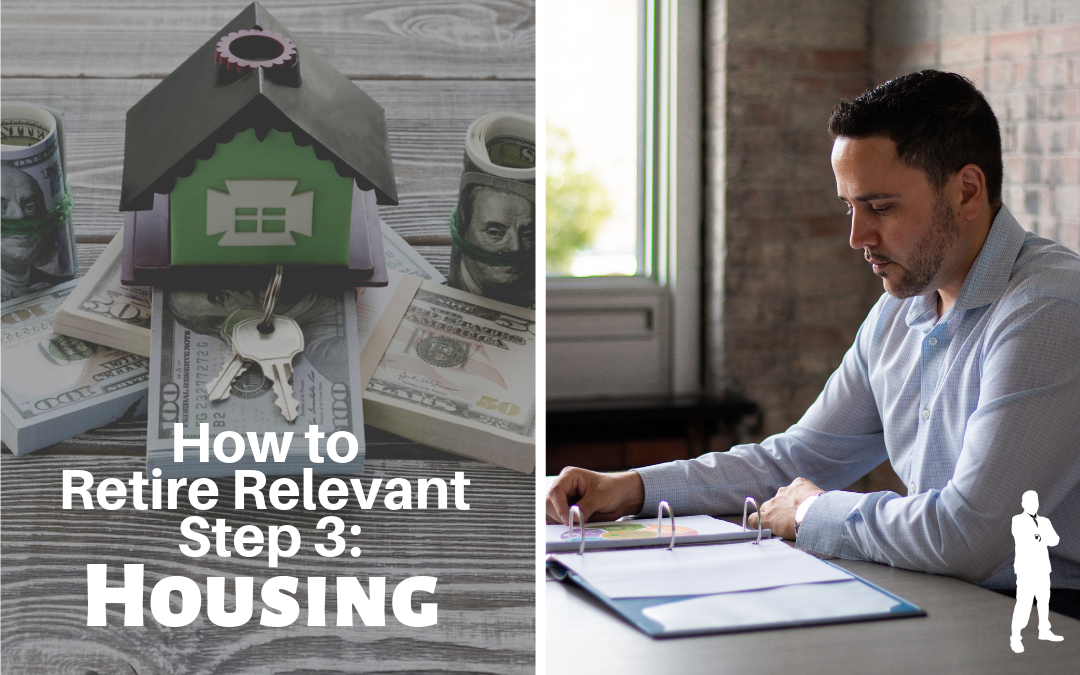Monday, September 9, 2019
How to Retire Relevant Step 3: Housing
The majority of people in our society have the goal of retiring early or at least comfortably. One key factor in that goal is housing. We all need a place to live in and throughout our lives, housing is generally our largest monthly expense. It eats away at a huge portion of our monthly income, rivaling even the taxes you pay on income. A key step to your retirement success is to eliminate this massive burden. The dream of homeownership still prevails amongst most. Sadly, TRUE homeownership is elusive. TRUE homeownership means owning your home outright, with no mortgage. This goal takes many, many years and in the meantime wise decision making needs to take place. This Step in my 7 Step Retirement System is designed to show you how housing plays an integral role in your future success. Housing and retirement are directly linked, and it is my goal that all my clients know their correlation. Let’s get started.
Why housing is so important to retirement
As mentioned, we all need a place to live. Also mentioned was that housing is generally our largest expense throughout our lifetime. If you are truly a master of your budget, 7 Step Relevant Retirement System Step 1, and truly a master of debt, 7 Step Relevant Retirement System Step 2, you can see why housing plays a key role in your everyday life. Firstly, the expense of housing is truly astronomical. In my popular Monthly Budget Worksheet, I account 35% of your take-home income for housing and housing relating expenses. Once you have paid taxes and then housing, you are left with a huge portion of your income gone and all you have done is covered your head. By taking a minimalist approach to budgeting, your goal should be to eliminate any unnecessary costs. Sadly, housing is extremely necessary. Luckily, housing is a cost that can be eliminated and even work for you. You will always have certain housing expenses: taxes, insurance, maintenance, utilities, etc. What you can do, however, is completely eliminate your largest monthly bill, your mortgage/rent. This is, in fact, Step 6 of the Dave Ramsey Baby Steps. A program of which I am a true believer.
There are many benefits to early home payoff, and I am going to describe them in this post. One huge benefit is the obvious monthly savings, with the mortgage expense now gone. Another benefit is the goal of becoming a “Net Worth Millionaire.” This means that you have put together enough assets and eliminated enough debts, to have a net worth (Assets – Liabilities) of over 1 million dollars. For my clients, this is the goal and the paid-off home is a HUGE part of. If you get to this level you can now breathe a sigh of relief. You have made it. This leads to another benefit and possibly the most important. There is a great sentimental and emotional value in having a paid-off home. You now OWN it. It makes you feel good and when you feel good you make good decisions. Let’s get into that a little bit more.
The goal of ACTUALLY owning your home
In this portion, I will go over two main hurdles when it comes to actual homeownership. The first hurdle is the flawed idea of your home as an investment. Wait for a second Joe, it is very common knowledge that your home is an investment. I will admit this to be true. I will also admit that I just mentioned being a “Net Worth Millionaire” includes the asset of your home. What I want people to understand about owning a home is that it is not exactly like other assets or investments. Investopedia describes an investment as such:
“In an economic sense, an investment is the purchase of goods that are not consumed today but are used in the future to create wealth. In finance, an investment is a monetary asset purchased with the idea that the asset will provide income in the future or will later be sold at a higher price for a profit.”
The key points in that definition are, not consumed today, provide income at a later date, or sold at a higher price for a profit. Your home must be sold to provide you with a profit. Your primary residence must be sold to provide you with income unless you rent a portion of it out. Your home must not be “consumed” today. Your home is essentially a large piggy bank that you contribute to every month. This piggy bank MUST be contributed to on a monthly basis. The keyword is MUST. This piggy bank must as be maintained and protected. This piggy bank is also not guaranteed to go up in value. In fact, there have been situations where people have lost money in real estate, think the housing crisis of the mid-2000s. This is not meant to scare you, more to open your eyes. This next part is meant to scare you.
There is a whole industry out there attempting to separate you from your piggy bank, or home. Lenders and real estate agents have realized the potential of your home to generate profits. As I mentioned in Step 2 of the Relevant Retirement System: Debt, keeping you in perpetual debt is extremely profitable. One way you are kept in perpetual debt is through consumer products like credit cards and lines of credit. Another way is through your home, your piggy bank. By prolonging consumer debt repayment, you are making lenders very wealthy. By not paying off your home, you are doing the same thing. This is why attaching Lines of Credit to your home is so incredibly easy. This is why you see commercials for reverse mortgages, 2nd mortgages, special home renovation lines of credit and a variety of other debt products. This is why the housing market has been on fire of recent times. They call it a bubble. What has happened is the inflation of home values driven by the demand for homes from the public. This demand is making lenders, real estate agents and brokers incredibly wealthy. Your piggy bank must be protected and that includes from yourself. The only way to fully protect it is to fully pay it off. It is then a tangible asset. It is then something of true value.
A Dozen Savvy Mortgage Tips – Budget Boss

The Fallacy of Home Equity
Again, I will admit that I include home equity in my client’s net worth calculations. What I will also admit is that this is not to be thought of as your cash, or your money. When you have that mentality, you forget how important paying off the home is. I understand that some debt is worse than others, ex. credit card debt versus a mortgage. That, however, is like saying horse crap smells better than pig crap. They both stink. Using your home equity nonchalantly is a recipe for disaster. You must guard this home equity with your life. Like I mentioned, your home equity is at risk from people trying to separate it from you. Know this. Accept this. Most importantly, don’t let this happen.
Here’s how some people misuse their home equity loans – CNBC
Early home pay down as it relates to early retirement
I think we understand that housing is a huge expense. One thing most people do not understand is that early retirement is not a normal goal, meaning it doesn’t happen often. Most people do not retire wealthy. The average person retires with a heavy reliance on government retirement benefits. This is because they do not save enough money and invest enough money throughout their lifetimes. One thing that gets in the way of this goal is the cost of living. While the cost of everything in your life will go up every year, the cost of housing has the potential to go down. You can mitigate these costs by paying off your home early. More importantly, you can super-size your investment deposits by paying off your home early as well.
One of my financial heroes, Chris Hogan of the Dave Ramsey family, calls this “Making Mortgage Sized Investment Deposits.” You see we are hampered throughout our working years by the cost of living. People bitch and moan that everything costs more all the time, and if you have been to the grocery store lately you know it’s true. I empathize. I see it, I am not oblivious to it. What I also know is that we can lose in some areas in life and win in others. If you can pay off your home in 15 years rather than 25 or 30, you have accomplished something very special. Let me illustrate this with some simple calculations.
I use this nifty mortgage calculator to make my mortgage calculations!
If you buy a home at the age of 30 and focus on paying that home off in 15 years, you have fast-tracked your retirement.
A $300,000 mortgage with a 3% interest rate will cost you $1,420/monthly. Because we cannot predict future interest rates, we will assume it stays the same throughout the mortgage. I know it will not, but let’s assume.
This is the standard 25-year mortgage.
During this time, you also commit to contributing $300 monthly to your retirement savings account.
At the end of your 25-year mortgage, you now have a paid-off home at the age of 55. You also have a very nice $272,697.29 in your retirement savings account, assuming we get a rate of return of 8% during those 25 years.
I think we all can agree that the 272K in your retirement account is not enough to retire early. Let’s look at another example.
In this example, you still buy the $300,000 at the age of 30. You still have a payment of $1,420 every month. You still squirrel away $300 monthly into your retirement account. However, in this example, you also put an extra $6,000 a year towards the balance of your home. That equates to $500 monthly.
Your home will now be paid off in 16 years, 3 months. Your retirement account will have less in it obviously, an amount of $113,114.61, because it has only been 15 years.
For the next 9 years, until the age of 55, you transition your mortgage payments, of which you now have none, into retirement savings. That means you are putting $1,700 monthly into your retirement savings account, $300 as before and $1,400 from the lack of mortgage payments.
At age 55 you now have a paid-off home, like in the above example, but you also have $490.074.50 in your retirement accounts. That is an increase of over 200K in retirement savings. That is also 9 years of mortgage freedom, a damn good feeling. Even more amazing is this fact. If your home value increased over those 25 years a conservative 3%, it should now be worth $634,505.87 from the original 300K purchase price. This added to your investment account value equals an outstanding $1,124,580.37. Congratulations, you are a “NET WORTH MILLIONAIRE.”
I see a couple of arguments that may develop from my stance or even the examples I give here, so let’s address those. One argument is that you can just invest that excess mortgage money and stick to the 25-year mortgage plan. If you were to do that this would be the result:
25 years investing $800/monthly, ($300 + $500, the extra amount you would have put towards the mortgage) = $727,192.77
As in the above example, your home value has grown over those 25 years to $634,505.87
This equals a total net worth of $1,361,698.63, a cool $237,118.27 more than if you paid your home off early and then ramped up your investing. This makes investing instead of mortgage paydown look far more attractive. The problem with this scenario, as in the one above, is that it relies on a lot of assumptions. Those assumptions include:
- Interest rates will remain low. While they are very low right now, they will not stay that way forever. Even a slight jump in those rates makes your overall net worth drop substantially. 3% rates bring your $237,118.27 profit down to $189,648.81, 4% brings it to $169,614.74, 5% to $147,235.00.
- Investment returns will be 8%. If you are a conservative or even balanced investor, paying down your mortgage is a better option given the returns you see may be in the range of say 5-6% and not 8%.
- That you will have no life-altering events during this time period. Again, I mentioned a paid-off home helps with peace of mind and scaling back investment contributions is far easier than scaling back a base mortgage payment. By having your mortgage paid off by the age of 45, you have eliminated the biggest FORCED payment you have every month. In times of turmoil, this is enormous.
When we have this many unknowns, dramatic unknowns at that, I like to go back to the basics. Having no debt is an amazing feeling. From my clients that have no mortgage payments, I see the burden released off their shoulders. My clients with mortgage payments always feel the weight of that payment. It bothers them. It’s an albatross. It is a control thing and I think the earlier you can take control of your financial future, the better. The next question is, how do we even find the money to pay off the mortgage early?
Renting Versus Owning: The Real Truth – Budget Boss

How to pay down your home early
I am sure this question has come up during this post several times. The examples I used both have you paying an extra $6000 annually to either your home or your investment account. If you are barely getting by as it is, how will you come up with that extra money every month to accomplish this goal. The answer to that is simple, but also not so simple. Steps 1 and 2 of the Relevant Retirement System are using a dedicated budget and paying down debt along with being debt-free forever. If you can accomplish those 2 tasks, building a monthly surplus, as mentioned in Step 1, should be no issue. Much of our monthly budget gets lost amongst expensive, yet useless, items like debt repayment and interest charges. Many of my clients spend $800 or more a month on car payments. That astounds me. A simple event liking dining out once a week can cost you upwards of $400 a month or more. By simply understand and analyzing a dedicated budget, you can find many ways to come up with money every month.
A simple way to pay down your home early is the bi-weekly accelerated mortgage payment plan. By changing the frequency and amount is each payment by even a small amount, you can shave years off the amortization period. My favorite method, however, is the annual lump sum deposit. Almost all mortgages allow you to make a lump sum deposit once a year towards your mortgage. The reason I like this method is that it gives you the flexibility to deposit what you want each time. Depending on your level of aggression, you could eliminate your mortgage very, very quickly. Some examples of annual lump sums include workplace bonuses, RRSP tax refunds, and savings accounts surpluses. I mentioned in Step 1 and 2 of the Relevant Retirement System that your emergency fund should be ever-growing, even beyond the level of comfort. The reason is that if you continually dedicate a small amount each month to emergency savings, you can take advantage of opportunities like annual lump sum mortgage payments. It is a worthwhile endeavor to make this kind of sacrifice.
5 Ways to Pay Off Your Mortgage Faster – Canadian Living
Conclusion
Everything I discuss in the 7 Step Relevant Retirement System is linked. It is a web of good decisions, dedication, and commitment to your future. Housing plays a vital role in your future retirement goals. It is a huge part of your net worth, your investment portfolio and your peace of mind heading into retirement. The key takeaways from this post are quite simple. An amazing goal like early retirement requires amazing resolve to pay off your home early and invest regularly. There is no escaping this. My clients MUST have a paid-off home in order to retire. Quite simply, the expenses are too great to have on a reduced income, which is what retirement usually entails. Another key takeaway is the fact that your home is only a true asset if it is paid off. This means protecting it and not tapping into home equity like it is a cash account. Your home is supposed to be your largest forced savings account. By attaching a line of credit to it you make it a massive credit card. You must remain ever vigilant of those attempting to access your equity. It steals from your future, so don’t allow it to happen. My final takeaway is this. Your home is far more than a place to rest your head. There are emotional attachments to owning a home. It is where you raise a family or spend your free time. It is where you evolve and grow as a person. This has meaning far beyond the walls and roof. Truly owning your home gives you an even greater sense of meaning. It is the kind of accomplishment that propels families to new heights, a new sense of freedom. It is the emotional uplift required to Retire Relevant. I think that’s pretty cool indeed.
“The ache for home lives in all of us, the safe place where we can go as we are and not be questioned.” – Maya Angelou

Want to get rolling with my 7-Step Relevant Retirement System? Click here to Book your meeting with the Budget Boss!
Email – joe@budgetboss.ca
Follow Budget Boss on – Facebook LinkedIn Twitter Instagram Pinterest Quora

